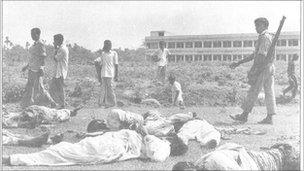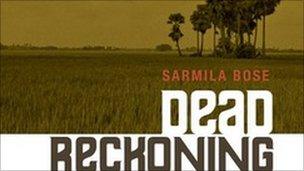Controversial book accuses Bengalis of 1971 war crimes
- Published

The book says both sides in the war committed crimes against humanity
Forty years ago Bangladesh won its independence from Pakistan in a short but brutal civil war in which it was claimed as many as three million people could have died. A book released to coincide with the anniversary has reached some highly controversial conclusions as the BBC's Alastair Lawson has discovered.
Sarmila Bose's book, Dead Reckoning, says that one of the bloodiest wars in the past half-century has been "dominated by the narrative of the victorious side" - Bangladeshi nationalists who won independence in 1971 from Pakistan.
She writes that both sides in the conflict "are still imprisoned by wartime partisan myths".
The introduction of her book does not exonerate Pakistani troops from committing atrocities during Bangladesh's bloody struggle for freedom.
But in what is certain to be viewed in Bangladesh as an extremely controversial conclusion, it says Bengalis - fighting for and against independence - also committed "appalling atrocities".
Dr Bose, a senior research fellow at Oxford University - and a former BBC presenter - says the Pakistani army has been "demonised" by the pro-liberation side and accused of "monstrous actions regardless of the evidence", while Bengali people have been depicted as "victims".
"This has led to a tendency to deny, minimise or justify violence and brutalities perpetrated by pro-liberation Bengalis," she says.
Already Bangladeshi academics at home and abroad are lining up to attack her book. One, the Dhaka and New York based writer Naeem Mohaiemen, told the BBC that she was guilty of "pushing her conclusions to an extreme" by arguing that the war was fought between two equally violent sides, "with the Pakistan army using only justified and temperate amounts of retaliatory force".
He has accused her of lacking sufficient curiosity to unpack the more complex issues behind 1971, "such as why the killings began, why the Pakistan state behaved so brutally and why Bengalis reacted violently".
Nevertheless, the book is one of the first by a Western author to subject the war to thorough and independent scrutiny.
Dr Bose went through published documentary evidence, travelled to remote areas of Bangladesh to interview elderly villagers and journeyed to Pakistan to question retired army officers.
'Shocking bestiality'
Her book says the Bengali nationalist rebellion in what was then East Pakistan "turned into xenophobic violence against non-Bengalis" especially against West Pakistanis and mainly Urdu-speaking people who migrated to East Pakistan from India at the time of partition who were known as Biharis.
"In the ethnic violence unleashed in the name of Bengali nationalism, non-Bengali men, women and children were slaughtered," Dr Bose says, arguing such atrocities took place in the towns of Chittagong, Khulna, Santahar and Jessore during and after the 10-month war.
"Non-Bengali victims of ethnic killings by Bengalis numbered hundreds or even thousands per incident... men, women and children were massacred on the basis of ethnicity and the killings were executed with shocking bestiality."
Some of the worst brutalities were among Bengalis themselves, Dr Bose says, between those who were defending the unity of Pakistan and those who were fighting for the liberation of Bangladesh.
While "the killing of pro-liberation professionals by pro-regime death squads in the dying days of the war stands out as one of the worst crimes of the conflict... brutalisation and elimination of those with a different political viewpoint seemed to be the hallmark of nationalist Bengalis too".
There is clear evidence, Dr Bose says, of the violence suffered by "non-Bengali victims of Bengali ethnic hatred".
"Of the corpses reported littering the land and clogging up the rivers, many would have been Bihari... as Bengali mobs appear to have killed non-Bengalis indiscriminately while the Pakistani army appeared to target adult Bengali men."
In one notorious incident examined by the author in the south-western town of Khulna on 28 March 1971, Bengalis "slaughtered" large numbers of Biharis in the town's jute mills.
'Gigantic rumour'
Dr Bose also examines the widely reported suggestion that three million Bengalis were killed by the Pakistani army. These figures are sacrosanct in Bangladesh, where the overwhelming majority of people continue to honour and respect those who died in the liberation struggle.

The book's conclusions are likely to be vigorously contested in Bangladesh
Describing the three million figure as a "gigantic rumour", she says it is "not based on any accounting or survey on the ground".
"None of the popular assertions of three million Bengalis allegedly killed by the [Pakistani] army cites any official report," she says.
"Claims of the dead in various incidents wildly exceeding anything that can be reasonably supported by evidence on the ground - 'killing fields' and 'mass graves' were claimed to be everywhere, but none was forensically exhumed and examined in a transparent manner."
Her conclusion over how many died has been roundly rejected by Mr Mohaiemen, who pointed out that Bangladeshis have themselves publicly dissected the problem of "numbers", going back to 1972 when the three million number was first cited.
"Researchers like Zunaid Kazi documented 12 different media estimates of death tolls. Thus, the implied 'hook' of Dr Bose's book, a claim to being the 'first' to dissect the death toll, rings hollow and is self-promotional.
"In any case, whether the death toll was three million or 300,000, does that make it any less of a genocide? That appears to be her intellectually indefensible conclusion."
Dr Bose does not ignore atrocities carried out by Pakistan and its supporters - her book has several chapters on this subject - concluding its army committed political and extrajudicial killings that in some cases were "genocidal".
She says: "Ultimately neither the numbers nor the labels matter. What matters is the nature of the conflict, which was fundamentally a complex and violent struggle for power among several different parties with a terrible human toll."
The Bangladeshi government has so far not commented on her book - but the country's attitude towards those who express dissenting views about the 1971 war was clearly seen in April when a film about a woman's love affair with a Pakistani soldier during the conflict was speedily withdrawn amid suggestions it distorted history.
The Indian edition of Sarmila Bose's book is being published by Hachette India and is due to be released in mid-June. The book is published by C Hurst and Co in the UK and by Columbia University Press in the US.